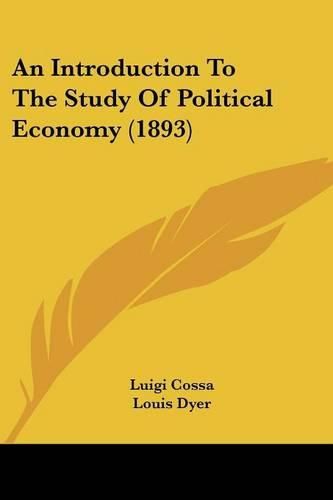Readings Newsletter
Become a Readings Member to make your shopping experience even easier.
Sign in or sign up for free!
You’re not far away from qualifying for FREE standard shipping within Australia
You’ve qualified for FREE standard shipping within Australia
The cart is loading…






Purchase of this book includes free trial access to www.million-books.com where you can read more than a million books for free. This is an OCR edition with typos. Excerpt from book: CHAPTER III POLITICAL ECONOMY AS RELATED TO OTHER BRANCHES OF KNOWLEDGE Political economy is most especially and intimately Auxiliary connected with the branches of knowledge which are and cr wholly or partly concerned with its subject-matter; and sciences. in spite of a clearly-marked difference, there is always some point of contact and affinity enabling it to give and take useful principles, in dealing with what may be called cither auxiliary or correlated fields of investigation. Economic history, statistics, and ethics, belong to the latter and correlative Jbianches, along with economical jurisprudence and private economics. The auxiliary branches are psychology, technology, and politics. (1) ECONOMIC HISTORY There are many affinities correlating political economy, ? an investigation into the essentials, the first causes and the rationale of wealth, as a social system, ? with the history of economics, ? a narration of all facts concerning this social system. in the first place, if brought down to History (1) date, furnishjaause(ul tests of theories arrived at by tests But to accomplish this the strictest scrutiny of all analogies must be insisted upon. These must be real and important, if conditions arising in one country at a given time are to prove anything relevant to another country at a different time. Amateurs io history and in economics often make the boldest appeals to the logic of facts and figures in order to bolster up the most flagrant form of the fallacy post hoc, ?it sometimes should read cum hoc, ?ergo propter hoc. But in competent hands the history of French assignats, of Austrian bank-notes, and American green-backs, has thrown a flood of light upon the theory of the ‘ compulsory circulation of paper currency. (2) Limit…
$9.00 standard shipping within Australia
FREE standard shipping within Australia for orders over $100.00
Express & International shipping calculated at checkout
Purchase of this book includes free trial access to www.million-books.com where you can read more than a million books for free. This is an OCR edition with typos. Excerpt from book: CHAPTER III POLITICAL ECONOMY AS RELATED TO OTHER BRANCHES OF KNOWLEDGE Political economy is most especially and intimately Auxiliary connected with the branches of knowledge which are and cr wholly or partly concerned with its subject-matter; and sciences. in spite of a clearly-marked difference, there is always some point of contact and affinity enabling it to give and take useful principles, in dealing with what may be called cither auxiliary or correlated fields of investigation. Economic history, statistics, and ethics, belong to the latter and correlative Jbianches, along with economical jurisprudence and private economics. The auxiliary branches are psychology, technology, and politics. (1) ECONOMIC HISTORY There are many affinities correlating political economy, ? an investigation into the essentials, the first causes and the rationale of wealth, as a social system, ? with the history of economics, ? a narration of all facts concerning this social system. in the first place, if brought down to History (1) date, furnishjaause(ul tests of theories arrived at by tests But to accomplish this the strictest scrutiny of all analogies must be insisted upon. These must be real and important, if conditions arising in one country at a given time are to prove anything relevant to another country at a different time. Amateurs io history and in economics often make the boldest appeals to the logic of facts and figures in order to bolster up the most flagrant form of the fallacy post hoc, ?it sometimes should read cum hoc, ?ergo propter hoc. But in competent hands the history of French assignats, of Austrian bank-notes, and American green-backs, has thrown a flood of light upon the theory of the ‘ compulsory circulation of paper currency. (2) Limit…